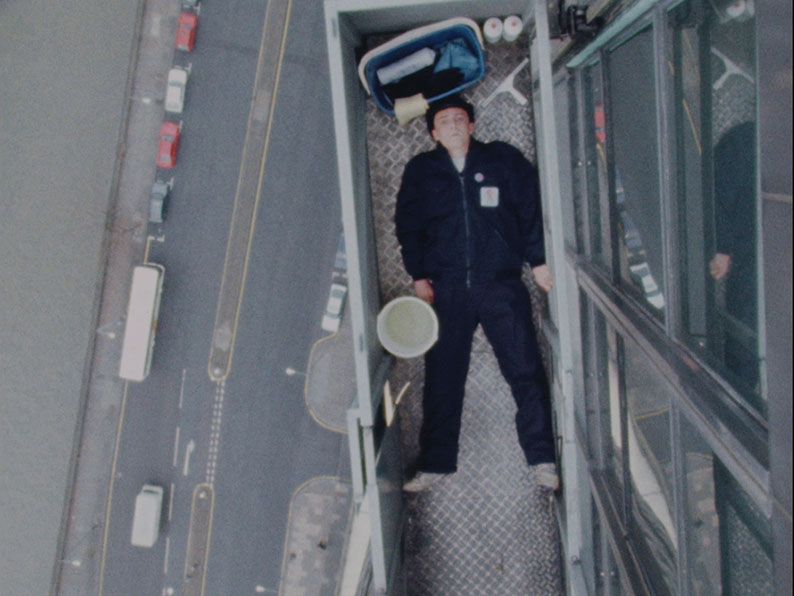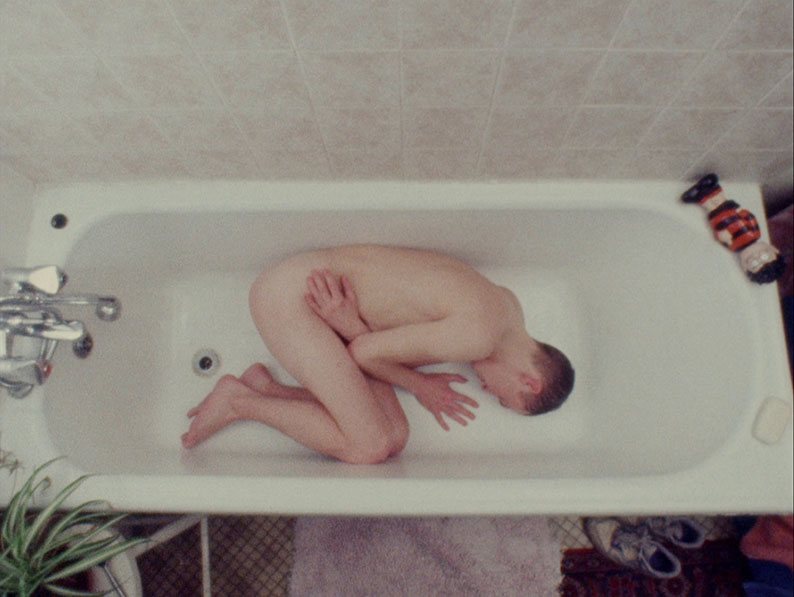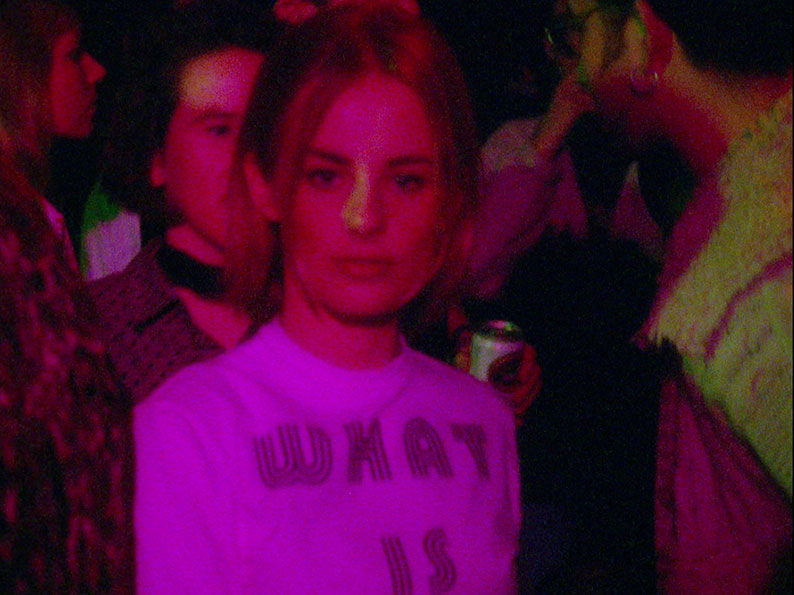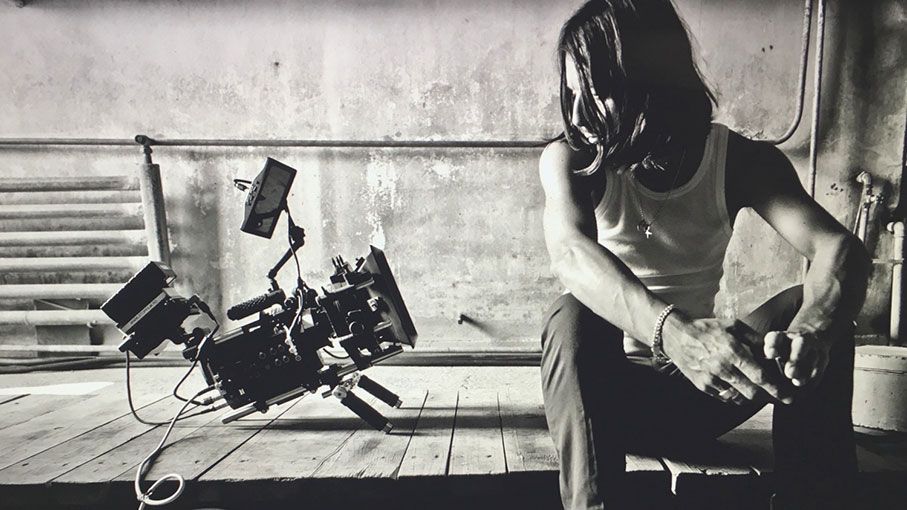A short note before I start: the title on the sleeve of this Blu-ray release is I am Weekender, but I’m treating both that and Weekender itself as twin main features, rather than the latter as an extra. The two films are playable from the main menu.
Weekender is a key document of the clubbing/acid house scene of the early 1990s, and captures a time and place at the time and place it was happening. But before that was “Weekender”, the song, and Flowered Up the band. At their heart were brothers Liam and Joe Maher. Brought up on a Camden housing estate, they became heavily involved in the acid house scene towards the end of the 1980s. Inspired by a Stone Roses gig, they formed the band, with Liam singing and Joe on guitar. Jeff Barrett, founder of Heavenly Records, who knew the brothers from the club scene, signed them up. Their first two singles, “It’s On” and “Phobia”, were minor hits. Then the band was signed to London Records with a five-album deal. “Take It”, a tribute to The Clash with lyrics by Joe Strummer, was a rather bigger minor hit, reaching number 34 in the singles charts in 1991. A rerecorded version of “It’s On” as a double A-side with “Egg Rush” also made its way into the Top Forty at number 38. Their first and as it turned out only album, A Life with Brian, came out in 1991. The band were featured on the covers of Melody Maker and the NME and the album reached number 23 in the charts. However, there was trouble between the band and the label, with Liam Maher having become a heroin addict.
“Weekender” was born over a month in a Sussex studio. It was originally forty-five minutes long, later shortened to twenty-five. Producer Clive Langer, who had worked with Madness, Elvis Costello and Morrissey among others, was brought in and the final version came in at twelve minutes and fifty-three seconds. The band had parted with London Records at this point but Jeff Barrett was enthusiastic and so the song was released by Heavenly. The song was a comment about ravers who were only such at the end of each week, as opposed to what could be called, as in the title of a film made ten years later, twenty-four-hour party people. Needless to say, the song was far too long for much (if any) radio play, but soon the idea was to make a film to accompany it. Enter WIZ, or Andrew Whiston to his parents, known to Barrett and as immersed in club culture as any of them. Barrett made him listen to the track and so Weekender, the film, came about.

The result is not so much a promo, though it could be taken as such, as a nineteen-minute short film, shot in 16mm, with a narrative. The original plan was for Liam Maher to play the lead, but his heroin addiction made him unreliable. The role was played by a professional actor, Lee Whitlock, suggested to WIZ by make-up artist Sacha Souter. Whitlock had been acting since the age of twelve, and was also familiar with the rave scene. The other lead role was played by a singer, Anna Haigh. The members of Flowered Up appeared in small parts. The film was shot in nine days.
There’s minimal dialogue, with mostly the music on the soundtrack. Despite its short length, Weekender falls into three parts, beginning with the dead-end jobs the principals are trapped in. Little Joe (Whitlock), a window-cleaner, lives for the Friday night and the club he goes to, just off London’s Leicester Square. There he meets a young woman (called The E Queen in the credits, played by Anna Haigh) who works on a supermarket checkout. Then, at the end of the night he emerges in the morning light, a comedown from the drug-enhanced high. The film and the song ends with a sample from the soundtrack of Quadrophenia in which that film’s protagonist (played by Phil Daniels) tells his boss to stuff items of office equipment up his arse, a comment as much as anything on the nothing job Little Joe has returned to. Until next weekend.
The film immediately ran into trouble. It was given a cinema release as a supporting short but the BBFC gave it an 18 certificate for its onscreen drug use. Newspapers railed against it for that reason. (I am Weekender shows clippings from the Daily Star, one telling us that Levi’s Jeans shops are to show the film “which shows teenagers taking drugs” and another from the same source calling Flowered Up a “sick rave band”.) The BBC and ITV banned it from being shown on their networks. However, the track and the film did have its influence. The song spent five weeks in the charts, peaking at number twenty (no Top of the Pops appearance though). The film picked up a cult following, with bootleg VHS tapes circulating as far away as Moscow and Buenos Aires. Weekender has had its influence, with Danny Boyle going so far as to say that without it there would have been no Trainspotting four years later. Needless to say, I have to take this on trust, as I wasn’t part of this scene, being likely five or more years older than many of the people on screen, and three and a half older than the late Lee Whitlock. But if you take club culture and acid house as a significant part of music and popular culture of the time, then this is a first-hand, from-inside document of it as it was happening, and not in hindsight.
Flowered Up had one more hit single, a cover of “Don’t Talk Just Kiss” as part of a three-act EP of Right Said Fred covers, along with Saint Etienne and Rockingbirds, The Fred EP, which reached number twenty-six. The band split up and a reformation attempt in 2007 came to nothing. Liam Maher died in 2009 of a heroin overdose and Joe Maher passed away in 2012. The film, or at least this restoration of it, is dedicated to them.

More than thirty years on, we now have the retrospective documentary, I am Weekender, directed and edited by Canadian-born Londoner Chloé Raunet. This is a go-through of the film, its making and its cultural significance, made up of interviews (some audio-only) conducted via Zoom. Visually, apart from the Zoom interviews, the film is made up of footage and rushes from WIZ’s archive. Interviewees include from Flowered Up the manager and lyricist Des Penney, keyboardist Tim Dorney, drummer John Tuvey and dancer at their live gigs Barry Mooncult, also vital participants in “Weekender” as Clive Langer and Jeff Barrett. From the film we hear from Lee Whitlock, Anna Haigh and Sacha Souter. WIZ is the main participant not present, though he does as mentioned above provide much of the visual material and we do hear from him elsewhere on this disc. Also interviewed are people talking about the film and its influence, including Trainspotting author Irvine Welsh (as the director of the film version, Danny Boyle, has said that the film would likely not have existed if it hadn’t been for Weekender), film director Lynne Ramsay and others. Annie Nightingale (as I write this the longest-serving DJ on Radio 1, who had become a major advocate for dance and club music) points out that Quadrophenia captured the mod movement something like a decade and a half after the event but Weekender did the same for rave and acid house at the time it was happening. Lee Whitlock died on 17 February 2023 and I am Weekender is dedicated to him.
I am Weekender is a Blu-ray release from the BFI, a disc encoded for all regions. This is a limited edition of 2000 copies, including a slipcase and postcard along with the booklet. I am Weekender has a 15 certificate. Weekender was originally passed 18, as mentioned above, but more recently was downrated to 15.
Weekender was shot in 16mm and this Blu-ray transfer is in the original aspect ratio of 1.33:1 (which presumably would have been either cropped or pillarboxed for cinema showings). The transfer is based on a 2K scan and remaster of the original negative. The colours are strong, though the image is a little soft in places and grain is evident, given its 16mm origins, but is natural and filmlike.
I am Weekender is in the ratio of 1.78:1, though much of it is pillarboxed into 1.33:1. Although it is in high definition on this Blu-ray, picture quality is variable depending on the source, with some of the Zoom interview material showing noticeable picture distortion. The remainder is based on the 16mm original of Weekender and the rushes and archive material.
The soundtrack on both films is LPCM 2.0, which plays in surround. Weekender keeps the surrounds busy with the music score, with a notably showy effect ten minutes in. The dialogue, what there is of it, is clear and the film is well-balanced. There are English hard-of-hearing subtitles available on I am Weekender.
Commentary on Weekender by WIZ
“Wotcher,” begins WIZ at the start of this commentary on a film he made thirty years before. He thinks himself fortunate that he was in the right place at the right time and being of the right age (early twenties) to make this film. He talks about images of death and birth, which he says were instinctive at the time of the production, but he can see them now. There are some more mythical overtones, including to the story of Orpheus and Eurydice and to that of Icarus. He quotes Danny Boyle saying that Trainspotting would not have happened without Weekender and goes on to say that without Lee Whitlock there would have been no Weekender.
Rushes Revisited (9:14)
As the opening caption tells us, these are four sketches made up from rushes from Weekender with isolated tracks from Flowered Up, produced by Clive Langer. The first of those rushes are storyboards. The others are live-action, in a record shop, a men’s toilets and finally animated stills on a club dancefloor.

Videos
Four promos, three for Flowered Up singles, and one associated with the contents of this disc by being directed by WIZ.
Take It (3:52)
WIZ’s first collaboration with Flowered Up was this promo for their third single. Partly a band performance (in colour) with some location footage near to the band’s base, in Euston. It also features Linda Small, a woman of colour, playing the Queen of England, no doubt provocative then and possibly more now, with the presence of a mixed-race woman in the royal family.
Phobia (3:46)
Flowered Up’s second single gets a promo directed by the late Paul Cannell, an artist who also provided the sleeve illustration for the record. He also designed Heavenly’s logo and the sleeve for Primal Scream’s Mercury Prize-winning Screamadelica. He captures the band in performance in slightly blurry black and white, overlaid with coloured “scratches” and shapes.
It’s On (3:36)
This is largely a band performance, shot in colour with blown-out whites. Like “Take It”, it was shot locally to the band, on the Regent Park Estate and some locals appear in it.
Raise (3:34)
Directed by WIZ in grainy sepia-toned black and white, rapidly cut, this is a promo video for Bocca Juniors, with Anna Haigh on lead vocals. It also features what the booklet refers to as “herbert youth” from Blackpool, Bootle, Lambeth and Vauxhall.
Nish (4:20)
An early film by WIZ, shot in 1989 in black and white Super 8mm at a party, with several people involved in acid house present, Anna Haigh among them. However, on the soundtrack is Mozart (Piano Concerto no 21 in C, K.467 Andante). This is four minutes of people clearly having a good drug-fuelled time but it’s an observation but not a condemnation. People take drugs to have a good time. It may not always last, though. What the title means I don’t know, though it appears with a subtitle, “Smiley Not Snidey”.
Turn It Up!: Interview with Chloé Raunet(27:25)
Chloé Raunet was not around for the rave scene of the early 1990s as she arrived in London from Vancouver, Canada, as a teenager in 1999. She had been taken by her mother’s friend to a nightclub at the age of seven, which began a fascination with nightlife and club culture. Based in Shoreditch, she “fell in” (her words) to the local electro scene. Raunet had no inclination to work in music, other than some attempts at lyrics, but instead made a documentary on Detroit’s techno scene with her then boyfriend. This introduced her to the synthesiser and she made music for a while. Back in London, she was cast in A Cradle of Filth promo video directed by WIZ and it was through him that she first watched Weekender, on a VHS tape. Raunet identified with the lifestyle of the film as she had herself been leading it, albeit a decade later. She points out that times then were different: you could live on the dole and/or live in a squat and create art, but now you can’t, and you could study humanities at University but that’s currently under threat. Raunet reconnected with WIZ at a funeral just before lockdown. As her mother was a documentary filmmaker, she had wanted to make films as a child, and WIZ encouraged her in this, and I am Weekender came about, originally as a Heavenly Films release for Weekender’s thirtieth anniversary, though later the BFI became involved. Previous experience with podcasts enabled her to construct a narrative by means of interviews, but she talks about how much of a newcomer she was to filmmaking, culminating in the editing and colour grade. Finally, she talks about seeing the film on a cinema screen in two sold-out screenings at the Glasgow Film Festival. She finishes by telling us that she is making music still and has a new film in development. The interview includes footage from both Weekender and I am Weekender.

Image gallery (3:20)
A self-navigating gallery, including storyboards, stills (colour and black and white), ending with a poster and a VHS sleeve.
Booklet
The BFI’s booklet runs to thirty-two pages. It begins with an essay by Miranda Sawyer (who appears in a television clip in I am Weekender). As a music writer who was certainly there at the time, she provides a thorough look at Weekender, beginning with Flowered Up’s career and their influences on the track itself, Pink Floyd and The Who as well as acid house. WIZ’s coming on board to make the film. WIZ’s influences included Ken Loach and Gus Van Sant, and there’s a nod to Saturday Night Fever in the end credits. Sawyer unpicks some of the death and rebirth imagery in the film, including the striking shot of Little Joe lying naked in an empty bath, in a foetal position. She finishes by detailing the afterlife of the film and its creators, WIZ, Lee Whitlock and Anna Haigh and the passing of the Maher brothers and of Lee Whitlock while this release was in preparation.
WIZ is up next, discussing his history with Flowered Up and particularly Liam Maher. This piece is a tribute to Maher, whom he compares to Pete Townshend in commenting on his generation’s culture. He sees Maher as emblematic of that culture when it finally died out, many left with drug addictions, which Maher later died of. This is followed by Des Penney on his history with the band as lyricist and manager and his meeting with Anna Haigh of Bocca Juniors and recruiting her to sing and tour with Flowered Up. She became one of the few leading women in a male-dominated scene. Adelle Stripe contributes a biography of Chloé Raunet, giving us more details, especially of her musical career, than she does in her interview on this disc. The booklet contains credits for the films and notes on and credits for the extras, and stills.
They used to say about the 1960s that if you remember them you weren’t there. (I was, though was in infants’ school at decade end.) You could say much the same of the acid house/club scene of the late 1980s and early 1990s, but if you were there, Weekender is a key document of it, made at the time from inside. I am Weekender ably puts this short film into perspective, as does this BFI Blu-ray release.
|